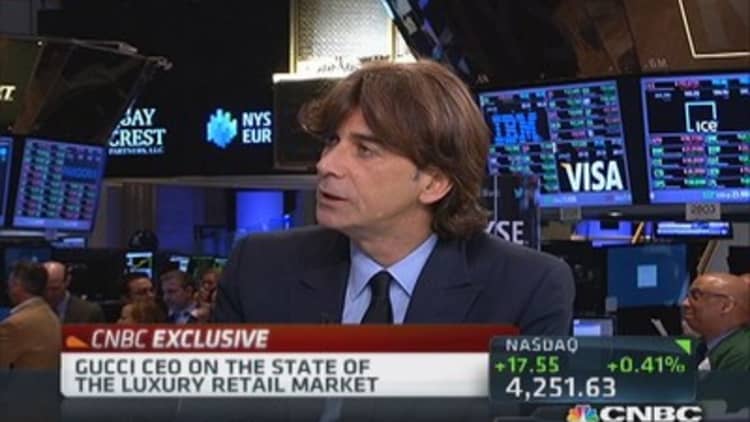Luxury retailers in China are suffering amid an anti-corruption drive and uncertain economic outlook and they're unlikely to recover anytime soon, analysts say.
"The anti-corruption crackdown in China is having a significant impact on luxury retail sales, from fashion garments, to shoes and watches," said Charles Yan, head of greater China Consumer Research at Standard Chartered Bank in Hong Kong. "We don't think it will recover quickly – at least not this year or next year."
A slowing Chinese economy and an official crackdown on corruption and lavish gift giving that started in 2012 have cooled the luxury market after years of double-digit growth.
Read MoreMulberry turnaround falters as luxury brands diverge
Sales of luxury goods in China rose just 2 percent in 2013 from the previous year, according to the consultancy Bain & Co. That's down from 7 percent growth in 2012 and 30 percent in 2011.
"The global growth for luxury sales is likely to be in the low single digits this year and in China I expect negative growth," said Yan.
Prada, famous for its luxury handbags, said this month that first quarter of 2014 profits fell almost 24 percent compared with the same period last year on flat sales in China.
Read MoreMercedes, Lexustopped by this luxury brand: Study
The Asia-Pacific is the Hong-Kong listed firm's biggest market and soft spending by Chinese consumers has helped push its shares down 18 percent so far this year.
It's not the only luxury retailer feeling the sting.
"The world's largest listed jewelry chain, Chow Tai Fook Jewelry Group, expects sales to slow down this fiscal year, amid the ongoing austerity drive and economic uncertainties in China," Ryan Huang, a market strategist at IG, said in a note.

"With slower growth of mainland tourists to China, Hong Kong-listed jewelry companies along with luxury goods companies with exposure to the Chinese market could face similar headwinds," he added.
The anti-corruption drive, which has included a crackdown on the use of public funds to buy luxury items and a ban on alcohol at military events, appears to be having a deeper-than-anticipated impact.
Read MoreMatching luxe handbags-for you and Fido
"The corruption crackdown is a very big deal and has had a big impact on restaurant sales, liquor sales (people give officials expensive bottles of Mao Tai (also called Bai Jio)), and other luxury goods," said John Rutledge, chief investment strategist at private investment firm Safanad. "They are doing this because the consensus inside the party leaders group is that people are getting angry, which is bad for political stability. This campaign will continue."
Earlier this year, a study by real-estate firm Knight Frank showed that a number of luxury brands missed their targets for store openings in China last year because of the anti-corruption fight and slowing growth.
China's economy grew 7.4 percent on year in the first quarter of 2014, slowing from 7.7 percent in the last three months of 2013. Recent data has pointed to stabilization in growth, easing worries about the outlook.
Read More
Also, analysts say luxury brands still benefit from Chinese tourists shopping at their stores, while a clamp down on classical luxury brands may see new designer brands flourish, they add.
"We don't recommend investing in the real classic brands, we recommended the second-tier luxury brands, new designer brands," said StanChart's Yan.
Safanad's Rutledge added: "The upside is that China is producing more legitimate private sector millionaires than the rest of the world so China still has to be the focus for luxury retailers. It's just going to be slower than it was."


